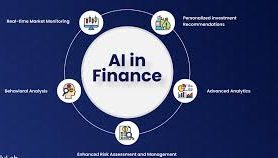- The Role of AI in Finance
- Risk Management: A New Frontier
- Trading: Algorithmic Precision
- Wealth Management: Personalized Financial Planning
- Ethical Considerations and Challenges
- Future Trends in AI and Finance
- Conclusion
The Role of AI in Finance
Artificial Intelligence (AI) has become a transformative force in the finance sector, enhancing various processes and delivering nuanced insights. This intelligent technology is redefining how institutions manage risk, execute trades, and approach wealth management. As AI continues to evolve, its integration into financial services is offering unprecedented opportunities and challenges.
Risk Management: A New Frontier
In the realm of risk management, AI leverages vast amounts of data to identify and mitigate potential threats. Traditional methods often rely on historical data and standardized algorithms; however, AI systems can analyze real-time information from diverse sources, including social media, market sentiment, and global news, to ascertain risk levels more accurately.
By employing machine learning algorithms, financial institutions can recognize patterns that might indicate emerging risks, such as market volatility or credit defaults. Firms can develop adaptive risk models that adjust to changing conditions, allowing for quicker responses to potential crises. This responsiveness can be crucial in minimizing financial losses and maintaining the stability of portfolios.
Trading: Algorithmic Precision
AI’s impact on trading is particularly profound. Trading algorithms powered by AI can execute thousands of trades in mere seconds, taking advantage of fleeting market opportunities. These algorithms analyze a plethora of market data points, including price movements, trading volume, and economic indicators, allowing them to make informed trading decisions without human intervention.
Moreover, AI can enhance high-frequency trading (HFT) strategies by incorporating predictive analytics. By forecasting market trends and price movements, traders can benefit from sophisticated insights that inform their strategies. With AI, trades can be optimized for factors such as timing, volume, and price, increasing the potential for profit.
Wealth Management: Personalized Financial Planning
In wealth management, AI is ushering in an era of personalized financial planning. Robo-advisors, powered by AI, can analyze clients’ financial situations and goals, offering tailored investment advice at a lower cost than traditional financial advisors. These platforms assess risk tolerance, investment preferences, and market conditions, creating customized portfolios designed to achieve specific objectives.
Additionally, AI is capable of monitoring portfolios in real-time, providing ongoing adjustments based on market fluctuations. Clients are informed of significant changes through automated alerts, ensuring they remain engaged in their investment journeys. This level of personalized service not only enhances client satisfaction but also fosters a deeper understanding of investment processes.
Ethical Considerations and Challenges
Despite the advantages, the rise of AI in finance is not without ethical considerations. Issues such as data privacy, algorithmic bias, and transparency present significant challenges. Financial institutions must navigate these concerns carefully, ensuring compliance with regulations and maintaining consumer trust.
Moreover, reliance on AI could lead to job displacement in certain areas of finance. While AI can automate routine tasks, the need for human oversight remains crucial, particularly when interpreting complex financial data and navigating regulatory environments.
Future Trends in AI and Finance
The future of AI in finance looks promising with emerging trends that are set to redefine the sector. Innovations such as natural language processing (NLP) are enhancing customer interactions through chatbots and virtual assistants, allowing for seamless communication and efficient service.
Furthermore, the integration of AI with blockchain technology presents exciting possibilities for transaction efficiency and security. As these technologies converge, they could lead to more robust systems for managing financial transactions and records.
Conclusion
AI is undeniably reshaping the finance landscape, with significant implications for risk management, trading, and wealth management. While the potential for increased efficiency and personalized service is vast, stakeholders must address the ethical challenges that accompany this technological shift. As AI continues to evolve, its role in finance will likely expand, making it essential for institutions to adapt and innovate in this dynamic environment. The path forward involves creating balanced systems that harness AI’s strengths while safeguarding against its potential pitfalls, ultimately paving the way for a more secure and efficient financial future.
